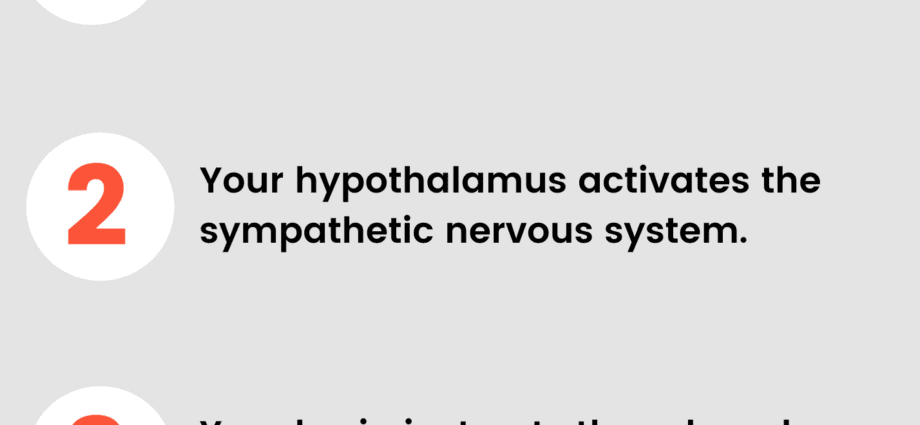Contents
Adrenaline: symptoms of an adrenaline rush
Stress hormone, secreted by the body in the event of strong emotion or danger, some flee it… or seek it. Adrenaline, a hormone of the catecholamine family secreted by the adrenal glands, gives the body a boost to allow it the appropriate behavioral response: flight or fight.
What is adrenaline rush?
During intense emotions or situations of danger, the adrenal glands, located above each kidney, secrete into the blood this famous hormone, adrenaline, belonging to the same family as norepinephrine and dopamine.
This secretion corresponds to the famous expression of “adrenaline rush”. Also called epinephrine, this hormone acts as a neurotransmitter by allowing information to pass from one nerve cell to another very quickly. Results ? Very characteristic symptoms, such as:
- rapid acceleration of the heart rate, called tachycardia;
- faster breathing because the brain takes oxygen more quickly;
- dilation of the pupils;
- increased blood pressure;
- dilation of the bronchi;
- there may be redness of the face and abdominal pain;
- sweat and wet hands.
Finally, an adrenaline rush is often a source of anxiety.
What are the causes of adrenaline rush
When some seek it, others find it unpleasant.
Extreme sports and adrenaline
Certain extreme activities (risky sports: parachute jumping, Formula 1, etc.) trigger the adrenaline rush, so that practitioners of these extreme sports can quickly fall into addiction and take more and more risks.
Certain emotions that are sources of adrenaline
For others, simple emotions can trigger it: a strong emotion such as shame, anger or fear. Other extreme emotional situations, causing a panic attack or an anxiety attack, would cause the same symptoms of an adrenaline rush.
Adrenal gland tumor and adrenaline
Finally, a rather rare but notable case of tumor of the adrenal gland, leads to an overproduction of catecholamines (noradrenaline and adrenaline). It is mainly manifested by high blood pressure but seizures during adrenaline rushes can occur. High blood pressure can be major during these attacks causing more headaches or chest pain.
Adrenaline in excess: stress or addiction
In some people, adrenaline is produced in excess because their daily life generates too much stress. If the stress is occasional, the secretion of adrenaline is short-lived and the body calms down, returning to normal functioning. But when stress is chronic, the body is subjected to prolonged exposure to this hormone. We are then in “alert” mode permanently, which exhausts the body, deprived of rest.
In addition to fatigue, this condition can generate serious illnesses:
- cardiac;
- depression;
- immune defense.
The adrenaline rush creates anxiety which in itself promotes the adrenaline rush. So, fear the maintenance. To end this vicious cycle, you have to learn to relax and unwind.
On the other hand, there are addictions to the adrenaline rush: athletes and extreme sports enthusiasts always seek the effects, even if it means risking addiction and putting themselves in a situation of withdrawal, where they feel exhaustion, irritability and restlessness. .
What are the treatments to lower adrenaline?
How to lower adrenaline?
In our daily life, feeling an adrenaline rush can be useful to us, in order to react to a danger, an emotion, or a punctual stress. However, when these symptoms occur too frequently, they can lead to fatigue in the body. In order to learn to control our adrenaline rushes, we must first try to control our emotions.
To this end, different solutions exist:
- engage in physical activity to relieve chronic and harmful stress;
- learn relaxation through practices such as meditation and relaxation therapy;
- be surrounded by family and friends;
- get enough sleep;
- limiting the intake of alcohol and addictions (cigarettes, coffee) can also help us avoid
- too frequent and exhausting hormonal surges.
Even so, if the adrenaline rushes occur repeatedly, they are probably panic attacks and a psychiatrist should be seen.
Adrenaline and treatment
This hormone is made of synthetic material and can be used by emergency departments for therapeutic treatment.
It is a treatment of choice to combat allergic hypersensitivity reactions and anaphylaxis (the most severe manifestation of an allergy) induced by exertion. Adrenaline has a vasoconstrictor action (decrease in the caliber of blood vessels) by significantly stimulating the nervous system.
Finally, this hormone is also administered in the event of cardio-respiratory arrest, in order to resuscitate a patient or in pulmonology to fight against asthma attacks.











תודה על ההספר הנפלא